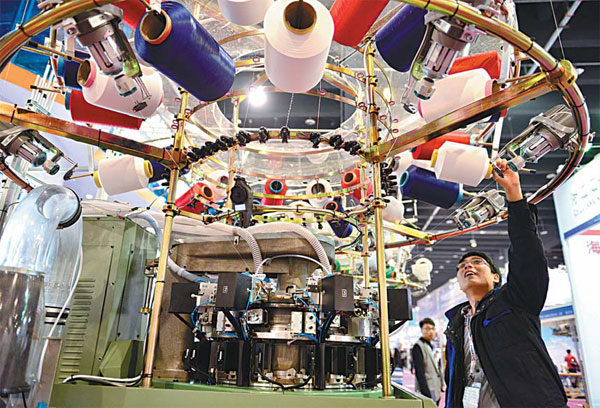Machinery surplus hits record
|
Weaving machines developed by a company in Shaoxing, Zhejiang province, on display at an international machinery manufacturing expo in Yiwu. China's machinery sector reported a record trade surplus last year. Lyu Bin / China Daily |
Private enterprises look to exports to cope with overcapacity
The machinery sector posted a record trade surplus of $79.1 billion last year, lifted by rapidly growing exports from private manufacturers, a senior official of the China Machinery Industry Federation said on Feb 11.
Facing weak domestic demand amid a slowing economy, private machinery companies looked actively for foreign customers, who bought $148.9 billion worth of products, up 14.35 percent year-on-year, according to data from the federation.
The industry as a whole had exports of $402.3 billion, up 8 percent, while imports rose 8.2 percent to $323.2 billion.
Cai Weici, a senior adviser of the federation, says that given the severe overcapacity in the domestic machinery market, the trade surplus is set to expand in the coming years.
"It also demonstrates that China's equipment products are becoming competitive in the global market," he says.
In recent years, private companies accounted for only about one-third of machinery exports, but the proportion will be more than half very soon, based on current developments, Cai says.
However, Chen Bin, head of the federation, says that although export volumes are expanding, the profitability of those exports are uncertain because many companies are selling abroad at low prices to soak up the output of their excess capacity.
Affected by the country's slowing economic growth, the machinery industry is facing challenges, Chen says.
In 2014, the sector expanded 9.4 percent, generating total revenue of 22.2 trillion yuan ($3.57 trillion), according to the federation. The growth rate was 4.4 percentage points lower than the previous year, Chen says.
The industry had aggregate profits of 1.56 trillion yuan last year, up 10.6 percent, but the gain was 5 percentage points lower than the previous year.
Chen says that profits were affected by declining prices and shrinking demand.
Private companies recorded total revenue of 12.7 trillion yuan last year, accounting for 57.3 percent of the whole industry. Their profits expanded 7.7 percent to 757.4 billion yuan.
"The private sector is gaining more importance in the machinery industry," Chen says.
He estimates that the industry will achieve 8 percent growth in sales and 10 percent growth in profits in 2015 and export growth will be about 6 percent.
"The machinery industry is deeply affected by the broader economy, which is undergoing a restructuring process," he says. "Both the domestic and overseas markets will stay weak this year."
There are also favorable factors for the industry.
The National Development and Reform Commission, the top planning body, has approved numerous road, airport, rail, hydropower and grid construction projects since October. Those projects will generate demand for certain products in 2015.
In addition, falling prices for such commodities as crude oil, natural gas, iron ore and metals will lower costs for machinery companies.

























